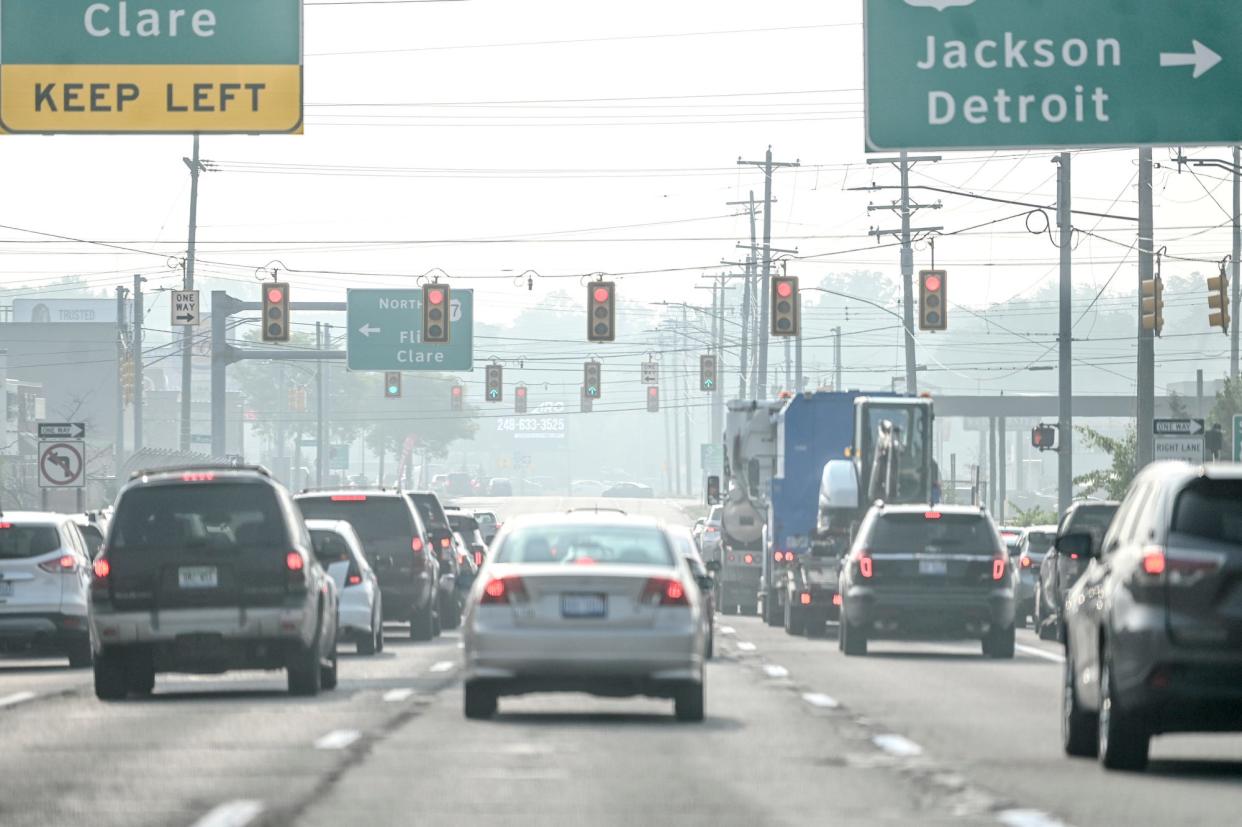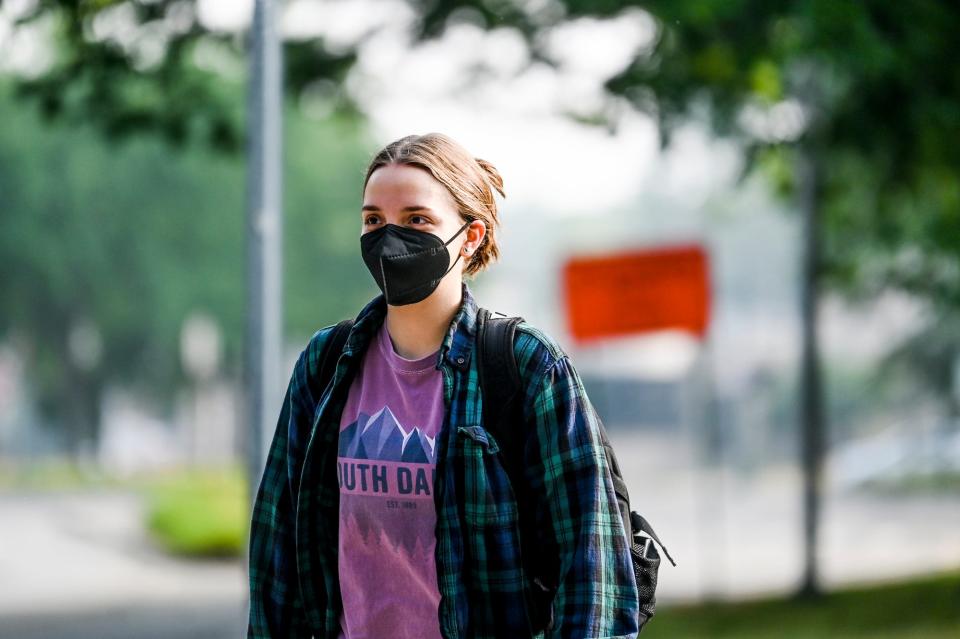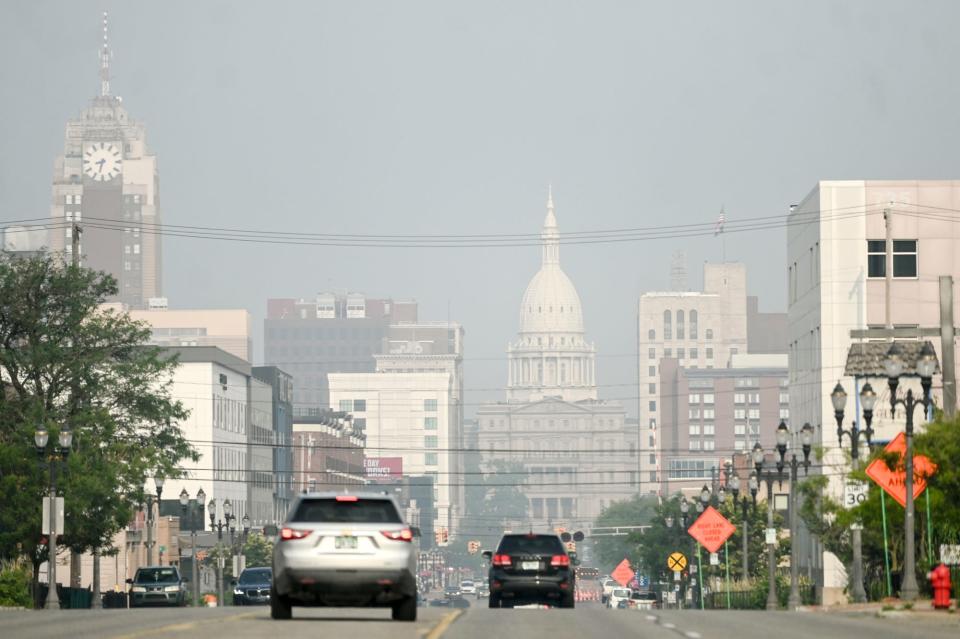Why does the smoky haze smell like plastic? When will it go away?

LANSING — Detroit has what may be the worst air quality in the world today, according to air quality measures provided by the National Weather Service.
Detroit's air is considered hazardous, with an air quality index score of 306. A score of 50 or less is considered "good."
Lansing's air quality is better than Detroit's, but still among the worst in the state with an AQI score of 206 Wednesday morning, which is considered "very unhealthy." By around noon, the score was down to 180 but still "unhealthy." Ann Arbor was at 234 Wednesday morning; 235, around noon.
Much of the smoky haze in the air is recirculating from Tuesday as winds changed, said Scott Thomas, a meteorologist with the National Weather Service in Grand Rapids.
"It does look like the smoke could hang around another day or so," Thomas said.

Thomas said the smoke was carried in with north-to-south winds, but those have shifted more westward, which is helping to reduce smoke coming from Canadian wildfires. There are more than 200 out-of-control wildfires burning in the country right now.
Unhealthy levels of pollutants from the smoke is covering the Great Lakes region, according to online air quality tracker AirNow.gov.
Michigan's health officials continue to warn vulnerable people to avoid prolong exposure to outside air.
The Ingham County Health Department is encouraging people to be aware of the elevated risk in the air and to take steps to limit exposure when possible, said Victoria Coykendall, a spokeswoman for the department. Anyone can get sick from exposure, but some people are more vulnerable, she said.
"The average air quality is expected to fluctuate between unhealthy for sensitive groups to unhealthy for everyone with the possibility of the Upper Peninsula and northern Lower Peninsula experiencing some hours when concentration (could) cause the Air Quality Index to be very unhealthy or hazardous for everyone," the Michigan Department of Health and Human Services warned people Tuesday.

That means anyone in a sensitive group — including young children, older adults or those with heart and lung disease — should stay indoors for any physical activity, and everyone else should limit the amount of time they are active outdoors.
Experts say it's best to avoid strenuous activity when air quality levels are unsafe outside and to stay indoors as much as possible. Use air purifiers to help the air quality inside, and wear an N95 mask if you must go outside.
READ MORE: Air quality advisory extended to Wednesday because of smoke
Why is the air quality so bad?
Air quality is unhealthy due to the level of particulates in the air from Canadian wildfires, from which smoke has drifted into the U.S. in the last several weeks. Zachary Yack, a meteorologist with the National Weather Service in Chicago, said wind patterns are largely driving where the smoky air goes.
Low pressure over the eastern Great Lakes is also causing the smoke to drift through northern Michigan, and across southern Wisconsin and Chicago, said Bryan Jackson, a meteorologist with the National Weather Service.
Thomas, the Grand Rapids-based meteorologist, said the winds are looking more favorable and the state should see much of the smoke clearing out by this weekend.
There are a handful of chances for thunderstorms in the Lansing area, especially overnight on Wednesday and Thursday and in the day on Saturday, Thomas said. Those storms would be limited but even a small amount of rain could help dampen the smoky smell, he said.
What is that smell?
The smell is a bit different from a bonfire, even though it's essentially a series of giant bonfires bringing the smoke. That's because wood fires emit volatile organic compounds, according to a toxicologist at the Michigan Environment, Great Lakes and Energy Department.
"Most of these VOCs are noticeable to our noses as the familiar 'campfire' smell but they break down quickly when exposed to UV radiation from sunlight. Other VOCs like benzene, formaldehyde and acrolein are also released and they outlast the 'campfire' VOCs. It's these chemical compounds that you're smelling as the smoke wafts around for a few days and settles to the ground and reaches your nose," according to EGLE.
There were 482 wildfires in Canada on Wednesday morning, the Toronto Star reported, 252 of those were burning out of control, according to the Canadian Interagency Forest Fire Centre.
It's one of the worst wildfire seasons on record for the country. Smoke from wildland fires burning in Quebec has even reached parts of southwestern Europe, NASA's Earth Observatory reported on Monday. Soot particles reached across 2,000 miles of the Atlantic Ocean, causing hazy skies in Europe. Air quality there is mostly fair because the particulates are higher in the atmosphere, NASA said.
The Toronto Star reported this week that the Canadian Interagency Forest Fire Centre said 76,129 square kilometers of forest and other land has burned since Jan. 1. That exceeds the previous record set in 1989 of 75,596 square kilometers, according to the National Forestry Database.
What about the animals?
Officials say pets and other animals can't wear masks outdoors to protect them from the smoke, but many of them might still need to go outdoors. It's important to keep monitoring their health and try to keep them inside as much as possible, said Dr. Aly Cohen with the Cornell University Riney Canine Health Center.
Michigan's assistant state veterinarian, Dr. Jennifer Calogero, recommended keeping pets indoor, avoiding strenuous activities and using filters or air conditioning indoors.
"Similar to human, animals are also affected when there are issues with air quality, especially birds, animals with underlying respiratory and heart conditions and other sensitive populations such as young or senior animals."
Check current conditions
How the air rating system works
State meteorologists forecast pollutants including ground-level ozone and fine particulate and declare an “Action Day” when air quality levels are expected to reach or exceed various health levels.
The MDEQ said the condition of Michigan’s air quality falls within the good and moderate categories most of the time, which is below 100. Other ratings include:
Unhealthy for sensitive groups (101-150): Sensitive groups include kids; people with asthma or heart disease and people who work or exercise strenuously outdoors.
Unhealthy (151-200): When the air is deemed unhealthy for all residents, regarding less of any health conditions.
Very unhealthy (201-300): At this level, the state recommends people voluntarily reduce air emissions and reduce exertion when working or exercising outdoors.
Michigan residents can sign up for alerts at www.michigan.gov/air and select the EnviroFlash button at the bottom of the page and follow directions to sign up.
Check the latest on wildfires and smoke with this map
Contact Mike Ellis at mellis@lsj.com or 517-267-0415
This article originally appeared on Lansing State Journal: Lansing why is it hazy today? Canada smoke wildfires

